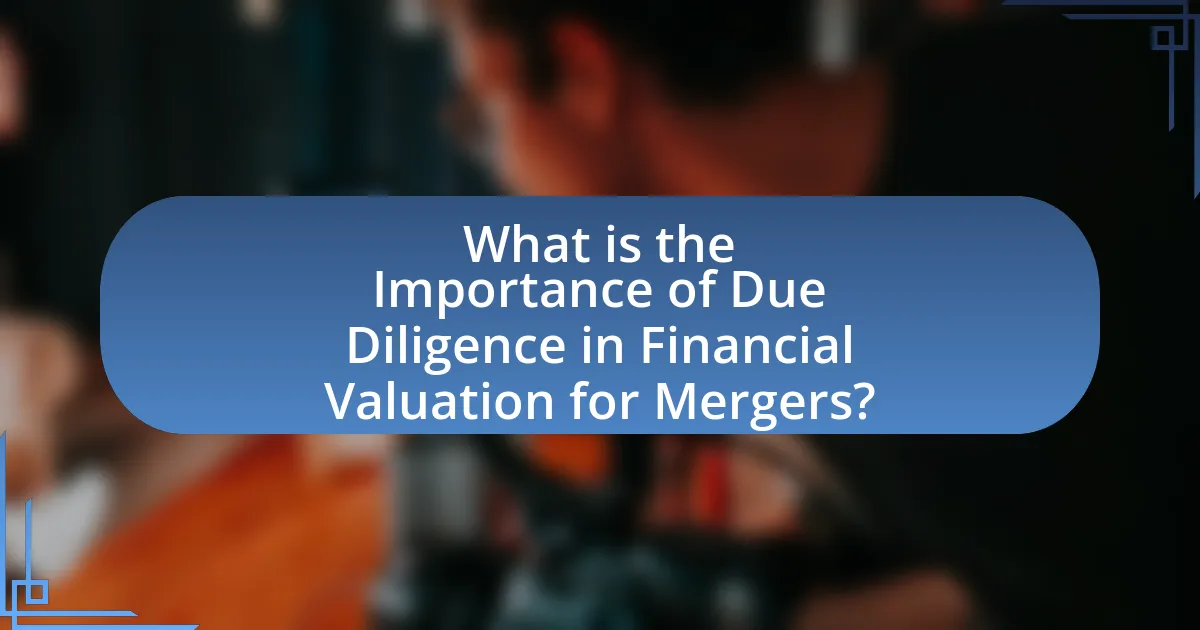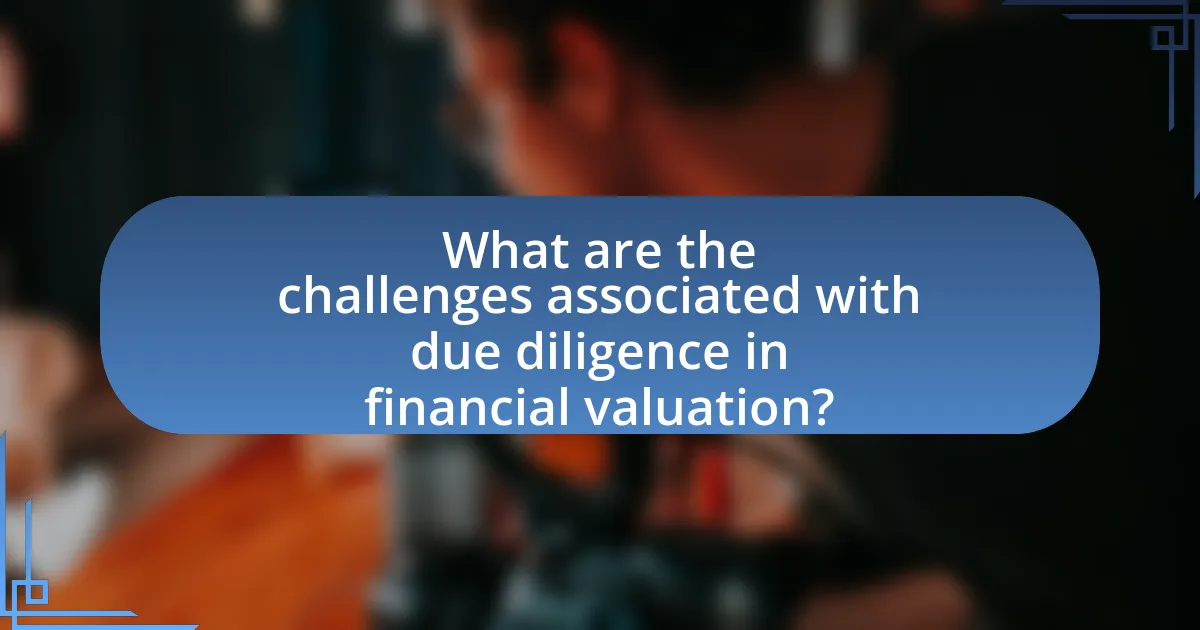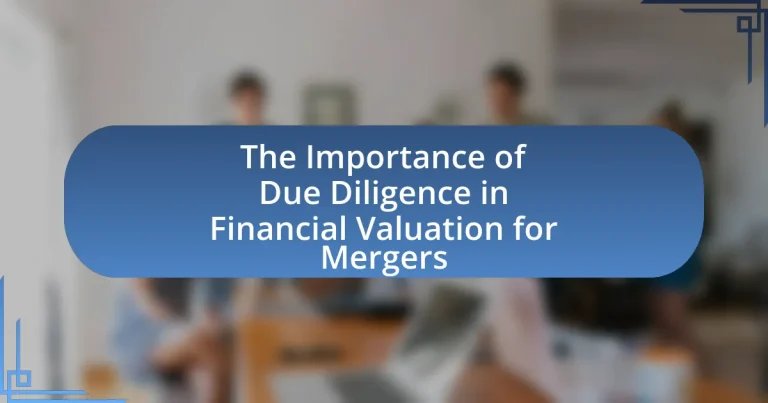Due diligence is a critical process in financial valuation for mergers, ensuring a thorough assessment of a target company’s financial health, risks, and opportunities. This article outlines the significance of due diligence in identifying potential liabilities, validating financial statements, and enhancing negotiation strategies, ultimately influencing the success of mergers. Key components of due diligence include financial analysis, legal review, operational assessment, and market evaluation, all aimed at mitigating risks and ensuring informed decision-making. The article also discusses common pitfalls, the role of technology in improving efficiency, and best practices for conducting effective due diligence in financial valuation.

What is the Importance of Due Diligence in Financial Valuation for Mergers?
Due diligence is crucial in financial valuation for mergers as it ensures a comprehensive assessment of the target company’s financial health, risks, and opportunities. This process involves analyzing financial statements, operational performance, and market conditions to provide an accurate valuation. For instance, a study by PwC highlights that thorough due diligence can uncover hidden liabilities and potential synergies, which can significantly impact the final purchase price and integration strategy. By identifying these factors, companies can make informed decisions, mitigate risks, and enhance the likelihood of a successful merger.
Why is due diligence critical in the context of mergers?
Due diligence is critical in the context of mergers because it enables the acquiring company to thoroughly assess the financial, operational, and legal aspects of the target company. This comprehensive evaluation helps identify potential risks, liabilities, and synergies that could impact the merger’s success. For instance, a study by Deloitte highlights that 70% of mergers fail due to inadequate due diligence, underscoring its importance in making informed decisions. By conducting due diligence, companies can uncover hidden issues, validate financial statements, and ensure that the merger aligns with strategic goals, ultimately enhancing the likelihood of a successful integration.
What are the key objectives of conducting due diligence in mergers?
The key objectives of conducting due diligence in mergers are to assess the financial health, operational capabilities, and legal compliance of the target company. This process aims to identify potential risks and liabilities that could affect the merger’s success. For instance, thorough financial analysis can reveal discrepancies in revenue reporting or hidden debts, while operational assessments can uncover inefficiencies or integration challenges. Legal due diligence ensures that the target complies with regulations and has no pending litigations that could pose risks post-merger. These objectives collectively help in making informed decisions, negotiating better terms, and ultimately enhancing the likelihood of a successful merger.
How does due diligence impact the overall valuation process?
Due diligence significantly impacts the overall valuation process by providing a comprehensive assessment of a target company’s financial health, operational efficiency, and potential risks. This thorough investigation allows acquirers to make informed decisions, ensuring that the valuation reflects the true worth of the company rather than inflated projections. For instance, a study by PwC found that 60% of mergers and acquisitions fail due to inadequate due diligence, highlighting its critical role in identifying liabilities and uncovering hidden costs that could affect future profitability. Thus, effective due diligence directly correlates with accurate valuations, ultimately influencing the success of mergers.
What are the main components of due diligence in financial valuation?
The main components of due diligence in financial valuation include financial analysis, legal review, operational assessment, and market evaluation. Financial analysis involves scrutinizing financial statements, cash flow projections, and historical performance to assess the company’s financial health. Legal review focuses on identifying any legal liabilities, compliance issues, or contractual obligations that could impact valuation. Operational assessment examines the efficiency of business operations, including management practices and resource allocation. Market evaluation analyzes industry trends, competitive positioning, and potential growth opportunities to determine the company’s market value. Each component is essential for providing a comprehensive understanding of the target company’s worth in the context of mergers.
What financial documents are typically reviewed during due diligence?
During due diligence, the financial documents typically reviewed include financial statements, tax returns, accounts receivable and payable aging reports, cash flow statements, and budgets or forecasts. These documents provide a comprehensive view of the company’s financial health, allowing potential buyers to assess profitability, liquidity, and overall financial stability. For instance, financial statements such as the balance sheet and income statement reveal key metrics like revenue, expenses, and net income, which are critical for evaluating the company’s performance and future potential.
How do qualitative factors influence financial valuation in due diligence?
Qualitative factors significantly influence financial valuation in due diligence by providing insights into a company’s operational strengths, weaknesses, and market position. These factors include management quality, brand reputation, customer loyalty, and industry trends, which can affect future cash flows and risk assessments. For instance, a strong management team can lead to better strategic decisions, enhancing long-term profitability, while a positive brand reputation can sustain customer loyalty and market share. Research indicates that companies with high-quality management and strong brand equity often command higher valuations, as evidenced by studies showing that firms with effective leadership outperform their peers by 15% in stock performance over five years. Thus, qualitative factors are essential in forming a comprehensive view of a company’s potential, impacting the overall financial valuation during due diligence.
What risks are mitigated through effective due diligence?
Effective due diligence mitigates risks such as financial misrepresentation, legal liabilities, operational inefficiencies, and reputational damage. By thoroughly assessing financial statements, legal contracts, and operational processes, organizations can identify discrepancies and potential liabilities before finalizing a merger. For instance, a study by PwC highlights that 50% of mergers fail due to inadequate due diligence, underscoring the importance of this process in uncovering hidden risks that could adversely affect the transaction’s success.
How does due diligence help identify potential liabilities?
Due diligence helps identify potential liabilities by systematically evaluating a company’s financial, legal, and operational aspects. This thorough examination uncovers hidden risks, such as outstanding debts, pending litigation, or regulatory compliance issues, which could adversely affect the value of the business in a merger. For instance, a study by PwC highlights that 60% of mergers fail due to unforeseen liabilities that were not identified during the due diligence process. By revealing these potential liabilities, due diligence enables informed decision-making and risk management strategies, ultimately protecting the interests of the acquiring entity.
What role does due diligence play in assessing market conditions?
Due diligence plays a critical role in assessing market conditions by providing a comprehensive analysis of a company’s financial health, competitive landscape, and potential risks. This process involves evaluating financial statements, market trends, and operational performance, which helps identify the true value of a business in the context of its market environment. For instance, a study by PwC highlights that thorough due diligence can uncover hidden liabilities and market dynamics that significantly impact valuation, ensuring that stakeholders make informed decisions during mergers and acquisitions.
How does due diligence enhance negotiation strategies in mergers?
Due diligence enhances negotiation strategies in mergers by providing a comprehensive understanding of the target company’s financial health, operational capabilities, and potential risks. This thorough analysis allows negotiators to identify value drivers and weaknesses, enabling them to craft informed offers and counteroffers. For instance, a study by PwC highlights that 70% of mergers fail due to cultural misalignment and lack of proper due diligence, underscoring the necessity of this process in aligning expectations and mitigating risks during negotiations. By leveraging insights gained from due diligence, negotiators can establish realistic valuations and negotiate terms that reflect the true worth of the merger, ultimately leading to more successful outcomes.
What insights can due diligence provide to negotiators?
Due diligence provides negotiators with critical insights into the financial health, operational efficiency, and potential risks associated with a merger. By thoroughly examining financial statements, contracts, and compliance records, negotiators can identify discrepancies, assess the value of assets, and uncover liabilities that may affect the deal’s terms. For instance, a study by PwC highlights that 70% of mergers fail due to inadequate due diligence, emphasizing its role in revealing hidden issues that could impact negotiations. This process enables negotiators to make informed decisions, adjust their strategies, and ultimately secure more favorable outcomes in merger agreements.
How can due diligence findings influence deal structure?
Due diligence findings can significantly influence deal structure by identifying risks and opportunities that affect valuation and terms. For instance, if due diligence uncovers potential liabilities or regulatory issues, the acquiring party may negotiate for a lower purchase price or seek indemnities to protect against future claims. Conversely, positive findings, such as strong financial performance or valuable intellectual property, can lead to more favorable terms, such as higher valuations or performance-based earnouts. Historical data shows that 70% of mergers fail due to inadequate due diligence, underscoring its critical role in shaping deal structure to mitigate risks and enhance value.

What are the challenges associated with due diligence in financial valuation?
The challenges associated with due diligence in financial valuation include data accuracy, time constraints, and the complexity of financial instruments. Data accuracy is critical, as inaccurate or incomplete information can lead to flawed valuations; for instance, a study by PwC indicates that 60% of financial transactions face issues due to data discrepancies. Time constraints often pressure analysts to rush the due diligence process, increasing the risk of oversight. Additionally, the complexity of financial instruments, such as derivatives or structured products, can complicate valuation efforts, making it difficult to assess their true worth accurately. These challenges can significantly impact the reliability of financial valuations in mergers.
What common pitfalls should be avoided during the due diligence process?
Common pitfalls to avoid during the due diligence process include inadequate scope of investigation, overlooking key financial documents, and failing to assess cultural fit. Inadequate scope can lead to missing critical information that affects valuation, as seen in the 2014 merger between Sprint and T-Mobile, where insufficient analysis of regulatory hurdles resulted in delays. Overlooking key financial documents, such as tax returns or contracts, can obscure liabilities and affect the accuracy of financial assessments, as demonstrated in the 2018 merger of AT&T and Time Warner, where undisclosed liabilities impacted the final valuation. Lastly, failing to assess cultural fit can lead to integration challenges post-merger, evidenced by the 2000 merger of AOL and Time Warner, which faced significant cultural clashes that hindered success.
How can incomplete information affect financial valuation?
Incomplete information can significantly distort financial valuation by leading to inaccurate assessments of a company’s worth. When critical data is missing, such as financial statements, market conditions, or operational metrics, analysts may overestimate or underestimate the value of assets and liabilities. For instance, a study by the CFA Institute highlights that 70% of mergers fail due to poor due diligence, often stemming from incomplete information. This lack of comprehensive data can result in misguided investment decisions, inflated purchase prices, or unforeseen liabilities, ultimately impacting the financial health of the acquiring company.
What are the consequences of overlooking key due diligence areas?
Overlooking key due diligence areas can lead to significant financial losses and increased risk in mergers. When critical aspects such as financial health, legal compliance, and operational efficiency are neglected, companies may face unexpected liabilities, overvaluation of assets, or integration challenges post-merger. For instance, a study by Deloitte found that 70% of mergers fail to achieve their intended value due to inadequate due diligence, highlighting the importance of thorough investigation in identifying potential pitfalls. This lack of attention can result in reputational damage, loss of stakeholder trust, and ultimately, a failed merger.
How can technology improve the due diligence process?
Technology can improve the due diligence process by automating data collection and analysis, which enhances efficiency and accuracy. Automation tools can quickly gather financial records, legal documents, and compliance information, reducing the time spent on manual reviews. For instance, artificial intelligence algorithms can analyze large datasets to identify discrepancies or risks that may not be immediately apparent, thereby increasing the thoroughness of the evaluation. Additionally, cloud-based platforms facilitate real-time collaboration among stakeholders, ensuring that all parties have access to the most current information. According to a report by Deloitte, organizations that leverage technology in due diligence can reduce the process duration by up to 30%, leading to faster decision-making in mergers and acquisitions.
What tools are available for enhancing due diligence efficiency?
Tools available for enhancing due diligence efficiency include data analytics software, automated document review platforms, and risk assessment tools. Data analytics software, such as Tableau or Power BI, allows for the visualization and analysis of large datasets, enabling quicker insights into financial health and operational performance. Automated document review platforms, like Kira Systems or Luminance, utilize artificial intelligence to streamline the review process, reducing the time spent on manual document analysis. Risk assessment tools, such as RiskMetrics or LogicManager, help identify potential risks associated with mergers by providing comprehensive risk profiles and assessments. These tools collectively improve the speed and accuracy of due diligence processes, which is critical in financial valuation for mergers.
How does data analytics contribute to better financial valuation?
Data analytics enhances financial valuation by providing accurate insights into historical performance, market trends, and risk factors. By analyzing large datasets, financial analysts can identify patterns and correlations that inform valuation models, leading to more precise assessments of a company’s worth. For instance, a study by McKinsey & Company found that companies leveraging advanced analytics in their financial processes can improve decision-making speed by 5 to 10 times, resulting in more informed valuations. This data-driven approach reduces reliance on subjective judgments, thereby increasing the reliability of financial valuations during mergers.

What best practices should be followed for effective due diligence?
Effective due diligence requires a systematic approach that includes thorough research, risk assessment, and documentation. First, organizations should establish a clear due diligence checklist tailored to the specific transaction, ensuring all relevant areas such as financial, legal, operational, and market factors are covered. Second, engaging cross-functional teams with expertise in finance, law, and industry specifics enhances the quality of the analysis. Third, utilizing technology tools for data collection and analysis streamlines the process and improves accuracy.
Additionally, maintaining clear communication with all stakeholders throughout the due diligence process is crucial for transparency and alignment. Finally, documenting findings and decisions meticulously provides a reference for future evaluations and compliance. These practices are supported by studies indicating that thorough due diligence can reduce transaction risks by up to 30%, highlighting its significance in mergers and acquisitions.
How can organizations prepare for a successful due diligence process?
Organizations can prepare for a successful due diligence process by establishing a comprehensive plan that includes assembling a skilled team, defining clear objectives, and gathering relevant documentation. A skilled team, comprising legal, financial, and operational experts, ensures that all aspects of the target company are thoroughly evaluated. Clear objectives guide the due diligence process, focusing on key areas such as financial health, compliance, and operational efficiency. Gathering relevant documentation, including financial statements, contracts, and regulatory filings, provides the necessary data for informed decision-making. According to a study by Deloitte, effective due diligence can reduce transaction risks by up to 30%, highlighting the importance of thorough preparation.
What steps should be taken to ensure thorough documentation review?
To ensure thorough documentation review, implement a systematic approach that includes the following steps: first, establish clear objectives for the review process to focus on key areas of concern. Next, create a checklist of essential documents, such as financial statements, contracts, and compliance records, to ensure all relevant materials are included. Then, assign specific team members with expertise in relevant areas to review each document, ensuring accountability and thoroughness. Additionally, utilize collaborative tools for real-time feedback and tracking of revisions, which enhances communication among team members. Finally, conduct a final review meeting to discuss findings and ensure all issues are addressed before concluding the documentation review. This structured approach is supported by best practices in due diligence, which emphasize the importance of comprehensive analysis in financial valuation for mergers.
How can teams collaborate effectively during due diligence?
Teams can collaborate effectively during due diligence by establishing clear communication channels and utilizing collaborative tools. Clear communication ensures that all team members are aligned on objectives, timelines, and responsibilities, which is critical in the fast-paced environment of mergers. Collaborative tools, such as shared document platforms and project management software, facilitate real-time updates and information sharing, allowing teams to track progress and address issues promptly. Research indicates that organizations that implement structured collaboration frameworks during due diligence processes can reduce the time taken for evaluations by up to 30%, thereby enhancing overall efficiency and decision-making quality.
What are the key takeaways for conducting due diligence in financial valuation?
Key takeaways for conducting due diligence in financial valuation include thorough analysis of financial statements, assessment of asset quality, and evaluation of liabilities. Financial statements should be scrutinized for accuracy and completeness, as they provide insights into the company’s financial health. Asset quality assessment involves examining tangible and intangible assets to determine their fair value, while liability evaluation ensures that all obligations are accounted for, impacting the overall valuation. According to a study by PwC, 70% of mergers fail due to inadequate due diligence, highlighting the critical nature of these steps in ensuring accurate financial valuation.
How can lessons learned from past mergers inform future due diligence efforts?
Lessons learned from past mergers can significantly enhance future due diligence efforts by identifying common pitfalls and best practices. For instance, analyzing previous mergers reveals that inadequate assessment of cultural fit often leads to integration failures; a study by McKinsey & Company found that 30% of mergers fail due to cultural clashes. By incorporating thorough cultural assessments into due diligence processes, companies can mitigate this risk. Additionally, past mergers highlight the importance of financial transparency; the failure of the AOL-Time Warner merger is often attributed to undisclosed liabilities. Future due diligence can be improved by ensuring comprehensive financial audits to uncover hidden risks. Thus, leveraging insights from historical mergers enables organizations to refine their due diligence frameworks, ultimately leading to more successful outcomes.
What strategies can be implemented to streamline the due diligence process?
To streamline the due diligence process, organizations can implement strategies such as utilizing technology for data management, establishing clear communication protocols, and creating standardized checklists. Technology, like data rooms and AI-driven analytics, enhances efficiency by automating data collection and analysis, reducing manual errors, and speeding up the review process. Clear communication protocols ensure that all stakeholders are aligned and informed, minimizing misunderstandings and delays. Standardized checklists help maintain consistency and thoroughness in the evaluation, allowing teams to focus on critical areas without overlooking essential details. These strategies collectively enhance the speed and accuracy of due diligence, which is crucial for effective financial valuation in mergers.


